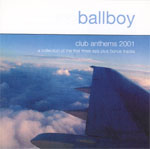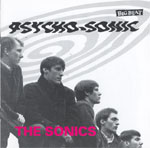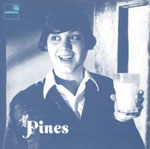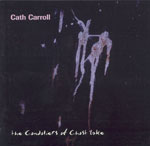Preparing To Swoon | |

| Recent listening? Well in all honesty, if we're talking about this past couple of weeks, there's only one name to take heed of. And that name is ballboy. Of course I've ranted elsewhere about their new album a guide for the daylight hours, and that's naturally been hard to shift from the stereo. One of the few things to displace it however has been their Club Anthems compilation which I scooped up from Amazon just as soon as I could. Club Anthems is a wonderful collections of moments, as anyone who has the string of EPs from which these tracks are taken can attest to. To pick highlights is to almost miss the point, but if pressed I'd plump for the divine 'Dumper Truck Racing' which is all downbeat beauty and guitars strummed like heart strings, or 'Olympic Cyclist' if only for those lines about shaving your legs and washing your bike. Or how about the monumental 'I Hate Scotland' which is six minutes of furrowed brows and aching wistfulness that sinks into my soul and refuses to come out except maybe encased in tears of blood. Like I've been saying to friends of late, listen to ballboy, and prepare to swoon. Seriously. So I've been listening to tons of ballboy. What else? Well how about John Hartford? I have Kevin to thank for this, as he put me onto the keenly priced Camden Deluxe 'two-fer' packages of Hartford albums that came out recently. I picked up two sets, so four albums from the '67 / '68 era. This from the days when artists would regularly be expected to release two albums a year, of course. All four are treats of country-folk singer songwriter bliss, but naturally with Hartford's slightly quirky eccentric edge. Of the four my favourites are the '68 pairing of The Love Album and Housing Project. The former has a song called 'Empty Afternoon of Summer Longing' that sounds just as I hoped it would, whilst the latter has 'The Girl With The Long Brown Hair' which just makes all kinds of right connections in my head and in my heart, and that's all I need to say right now. The Rockingbirds covered a Hartford song, 'In Tall Buildings' way back, and that in itself should be reason enough to investigate these reissues. And at nine or so quid for two albums, the price is indeed right. |

| John Carney recently mentioned reading about Ruth Copeland on the Poptones website. I didn't really know if Poptones was still going, but the website seems to suggest it is, although their excellent string of reissues seems to have ceased. In its stead the old Rev-Ola imprint appears to have been resurrected, and that's no bad thing. The new incarnation of Rev-Ola has a bundle of budget priced releases already, and I picked up five in the past month or two. First off there's Visualize by Thomas and Richard Frost, a couple of sharp dressed chaps who made some terrific pure-pop back in that age when the '60s merged with the '70s. A golden era in Pop, for certain. This Visualize set is terrific mix of electric folk and proto-power-pop and has great notes penned by Alec Palao, a name some will no doubt remember from that ace Californian band of the '80s and early '90s, The Sneetches. Poptones of course released a Sandy Salisbury collection a year or so ago, so it's some pleasant surprise to see another Salisbury collection on Rev-Ola. Falling To Pieces is a mixture of recordings made between 1967 and '69 and is a different collection of songs to the previous Poptones release. It's every bit as wonderful though, and Sandy shows on these songs what a fabulous ear he had for spot-on melodic Pop perfection. Aided and abetted by his Millennium buddies Curt Boettcher, Lee Mallory, Joey Stec, Michael Fennelly, Doug Rhodes and Ron Edgar, this is supreme summer soft pop that positively glistens with the sprinkling of diamond dust. Listen to songs like 'Love Divided By Two', 'Together In The End', 'Candy Kisses' and 'Cecily' and melt away. Speaking of Lee Mallory, there's a great collection of his recordings on Rev-Ola too. Opening with the brilliant Bob Gibson / Phil Ochs penned 'That's The Way It's Gonna Be', this collection is actually mainly Mallory originals, once again with a supporting cast of musicians that include members of the Ballroom and Millennium. With such a canon of brilliance, how could this collection fail to hit the mark? Also in there providing backing vocals are Sheri and Dotti Holmberg, and did I ever tell you how great Dotti's Sometimes Happy Times Sundazed reissue was? Last of the Rev-Ola releases for now is the Eternity's Children collection. Eternity's Children made magical West Coast soft-pop, which was strange because they came from Mississippi. Their story, catalogued in the excellent sleeve notes by soft-pop aficionado Dawn Eden, is equally strange, full of na¥ve miss-management and missed opportunities. The sound of what they produced in the mid to late '60s, however, is testament to what a great group they were, and could have been. This collection is right up there with the Mamas and Papas and the Millennium (maybe no surprise since the ubiquitous Boettcher had a hand in the production of several of the numbers, as indeed did Keith Olsen) and is another essential Rev-Ola reissue. Damn them, can't they slow down? My bank balance can't take it. |

| Now I never much liked all the 'Grunge' stuff that came out of the US Northwest back in the '90s. It was all too brown and muddy for me. It seemed strange that so many groups could all sound the same and come from the came city, or at least the same surrounding environs. It didn't occur to me that those groups were maybe carrying on some kind of odd historical-geographic tradition. This thought didn't strike me until last week in fact, when I picked up the Sonics Psycho-Sonic and the Wailers' Fabulous Wailers compilations. Both these groups came out of the Northwest back in the late '50s and early '60s, and both made a kind of proto-punk rock'n'roll. Or at least that's what the myths tell you. Actually I guess those myths are pretty accurate, judging from the sounds on these CDs. It's hard to judge just how sharp and strange a group like The Wailers must have been in the late 1950s when Rock was in its infancy, but to me these records still sound spooked and super-cool. There's a great sleazy quality to tunes like 'Beat Guitar' or 'Snake Pit' and it all comes out sounding like a soundtrack to those great Pulp novels of the time that were all torpedo breasted wanton women and moody blokes in leather smoking cigarettes. This is doubtless the sound that reverberated inside the heads of J.D.s as the cops slapped their wrists and daddy took the T-Bird away. Within four or five years The Sonics took the rawness and undercurrents of sex of the Wailers to new heights on songs like their classic 'Witch' and the fabulously unhinged 'Strychnine'. The legends of the times tell us that parents and school principles of the Northwest feared the Sonics for their wild ways, and listening to these recordings it's possible to hear why; for this is unbridled passion and sex transmuted into electricity, and is a million times more threatening in it's simplicity than any number of Nu-Metal fakers with their histrionics and make-up. And what does this have to do with 'Grunge' exactly? Well, I'm not entirely certain, except to say that perhaps the very best, the most POP of the Grunge groups (okay, I'm thinking, basically, Nirvana at their Pop finest) did indeed construct themselves in the historical mould of the geography, whether intentionally or not. In fact not unlike the Detroit deal, where a sonic signature is certainly audible coming through from the '60s to the present day; both in the singular threads of Soul and Rock and the merging of those threads in the likes of the magnificent Dirtbombs. Whatever. |

| I read somewhere recently that groups like New Zealand's The Datsuns and The D4 were some kind of inheritors of a Punk mantle, so I thought I would investigate them. I wish I hadn't bothered. I don't hear anything in The Datsuns except AC/DC, and you know I always hated AC/DC. They have long hair too. Hippies. And actually The Datsuns perfectly highlight the way that the whole idea of 'what Punk might be/mean' has been hi-jacked by the hateful Heavy Metal gangs. I guess in some ways this is fine because who really cares what defining what Punk is or isn't, after all? It's just... somehow it irks me. Somewhere inside I wish that when fourteen year olds talk about Punk they're thinking of Kleenex or Television and not AC/DC. Or The Datsuns. The D4 are miles better than The Datuns and even on occasion have a blast of noise that makes my ears perk up and my feet twitch and want to go jump around the attic pretending to be, I dunno, Richard Hell when he was a Heartbreaker. Perhaps this explains why they are at least partly on the legendary Flying Nun label (I can't make head nor tails of all the record labels listed on the back of releases these days). Once upon a time I dare say I would have dug The D4 for their kinda infectious rock'n'roll attack, but I can take it leave it this time. On a totally different tack, if not a different planet indeed, is the Conference of Birds project. Now this is impossibly limited edition stuff. The story goes that fifty copies of this four CD set were made up and that when the fifty are gone, that's the end of the story. It's a great story too. It starts around 1987 when Mike Gosling recorded himself playing some old school recorders and continues fifteen years later when he and collaborator Richard Bell (one time Blue Aeroplane, co-creator of the classic 'I Want To Hang Out With Ed Ruscha') added some loops, drones, and bowed guitars, in the process giving birth to the Conference of Birds. Initially planned as a short project to make one album's worth of material, they got carried away and ended up with four. With shades of Every Man and Woman or United Kingdom era Ultramarine, Conference of Birds offer a strange and wonderful rural sound that at turns merges folk with techno, drones with dub and with the odd sample of 16th Century music thrown in for good measure. Warm, engaging and hypnotically beautiful, this is smart music that isn't too clever for its own good. It's doubtful if you'll be able to track down any of these four CDs, but you could try dropping by the Evensong website and seeing what's what. There's a fine sampler CD on offer for the paltry sum of a quid fifty, and another compilation called the soul moves at walking pace that will set you back around a tenner. Both collections have Richard Bell tracks, but only the latter has a Conference of Birds track. The latter too has contributions from the likes of Ian Kearey (old Blue Aeroplanes fans will take note of that) and Jacques, so is well worth tracking down. |

| Jacques also crops up with a new five track EP on Acuarela. Jacques of course is Anthony Reynolds, moonlighting from fronting Jack, that band who have in the past specialised in making such a grand job of updating Scott Walker for the end of the 20th Century. As Jacques, Mr Reynolds continues his obsession with crooner aesthetics, and here turns in five cuts that come soaked in red wine, vodka and hair lacquer. Spanish label-mates Migala help out on writing credits for the opener 'Cowgirls and Gringos', and Lorca gets in on the act too, providing the raw materials for the rather gorgeous 'Serenade'. It all owes a lot to Tindersticks too, and 'all of me loves a little piece of you' even starts off with the line 'your milky teeth are itchy', which is fine by me. And then there's that man Richard Bell again, collaborating with Reynolds on the EP highlight 'Winterpollen', creating a marvellously seductive moment that rises above the residual caricature of most of the other tracks and simply sounds fragile and perfect. Regular readers will know I have a soft spot for The Pines, so it's no surprise then that their latest single has been spinning on the record deck. Released through the Spanish Annika label, 'Milk Bar' is a four tracker that comes sleeved in a cover that pays homage to the Smiths' 'What Difference Does It Make'. That's the one with Morrissey holding the glass of milk. The one that replaced the one of Terrence Stamp holding a bag of cocaine, although that one seemed to crop up again on later pressings, or so it seemed to me. Whatever, despite the visual reference, The Pines really sound nothing like The Smiths, unless it's maybe a distantly heard echo of the brittle melancholia of 'Please, Please, Please...' Pam Berry once more sounds transcendent, whilst Joe Brooker does a great Stephin Merritt meets Ben Watt, particularly on 'Some Slow Afternoon' which swoons slowly in the moonlit park, and 'Satellites' which is a breezy autumnal skip of a tune that could be a recently unearthed gem from the North Marine Drive sessions. Speaking of Morrissey, it was of course via The Smiths that I became aware of Twinkle, thanks to their cover of her 'Golden Lights' that appeared on the flip of the 'Ask' 12". That of course was never one of the Smiths' finest moments, but nevertheless I've always wondered what the original sounded like. Now, thanks to the RPM release of the Golden Lights compilation, I finally know that it sounds a hell of a lot better than the Smiths' version. In fact all of this Twinkle collection sounds much better than I honestly expected. From the Shangri-La's like opener 'Terry' through her take on Gainsbourg's 'Poupee De Cire, Poupe De Son' (here as 'A Lonley, Singing Doll') and 1982's unexpectedly divine b-side 'For Sale' Twinkle sounds wistfully, charmingly innocent but simultaneously world worn and weary. Lovely stuff. |

| Finally then, there's Cath Carroll and her new album for LTM The Gondoliers of Ghost Lake. Once again working in collaboration with her husband Kerry Kelekovich, Cath shows us what a fine touch she has for effortlessly merging and blending styles and influences into something that sounds both contemporary and timeless all at once. The influences are perhaps more subtly hinted at here than on, say, her recently reissued 1991 debut England Made Me, but nevertheless, there's a grand mix of Latin, folk, dub, psych-rock and even bluegrass seeping out of this album. Standouts for me would be 'Free', with it's hints at '60s psych-soft-pop and rock; 'The Divine Miss A.' which tells the tale of a transgendered Mancunian at the turn of the '70s/'80s and which comes over all Kinks meets Madonna via Morrissey; the eerie sophisticated folk-dub of 'Man Goes Down The Highway' that you could play next to Luscious Jackson and not find out of place; the upbeat romp of 'Mystified' that frolics around the grey streets draping coloured garlands from the lampposts, dreaming of Brazilian sunsets. This is an accomplished and memorable album that will only continue to grow in stature with repeated listenings. I recommend you pick it up at the first opportunity. Now, where's that ballboy album again? © 2002 Alistair Fitchett |